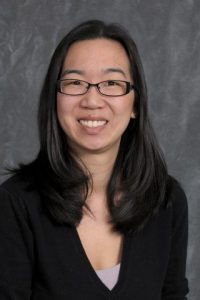New Faculty Spotlight: Professor Jennifer Wong-Ma Shares Her Passion for Teaching

Jennifer Wong-Ma, an Associate Professor of Teaching in the Computer Science Department, joined the ICS faculty in September 2018.
Can you tell us about your background and what brought you to UCI?
I was born and raised in California and completed my B.S., M.S. and Ph.D. in computer science at UCLA. For 12 years, I was a faculty member at Stony Brook University in New York. During my term there, my teaching and role in CS undergraduate education steadily increased.
Teaching is my passion. I love being able to interact with students, to be in the trenches with them. I also love instilling knowledge and seeing that light bulb go off. My interface and direct communication with the students provided me with insights to augment and support the CS undergraduate program. Unfortunately, the State University of New York educational system does not currently have a promotional track for teaching faculty. Any options available meant moving to an administrative position, which would have limited my teaching. The lack of upward mobility at Stony Brook is what drove me to start looking at other universities with teaching-track faculty positions.
Additionally, as I now have two children, being closer to family is a greater priority. The majority of my family is based in California, so the teaching-track faculty positions in the UC system provided an opportunity not only for myself but also for my husband and kids to be closer to family. The UC system and UCI are leading the charge to change the way society looks at undergraduate education with the teaching-track faculty position. It has been a blessing to join the CS department at UCI, where quality education is an active priority.
What courses are you teaching this fall?
I’m teaching CS122A\EECS116—Introduction to Data Management. My first lecture here had 380 students in the 400-person lecture hall — it was the biggest lecture of my 12 years of teaching! Having a relationship with my students is very important to me. Courses and new faculty can often be intimidating for students. I wanted the students to feel comfortable with me, so to start the first lecture, I let the class ask me three questions about myself. I think that opportunity set the tone for the course and interactions with me.
I’m also co-teaching ICS 139W—Critical Writing on Information Technology, with Professor Shannon Alfaro. This course is 100 percent online, which is something new for me. There are many pros and cons of online courses. For me, the hardest part has been having zero interaction with the majority of the students. I find it difficult to gauge how the course is progressing, so I’m already looking forward to feedback from the course evaluations.
Can you talk about your research?
Currently, my focus is on teaching and quality teaching practices. This last March, I had the opportunity to go to SIGCSE, which is a symposium for computer science education. It was an amazing experience to meet fellowteaching faculty who are passionate about undergraduate education and about developing tools and technology for their classrooms.
One of the key shortcomings I’ve seen firsthand is how faculty members build their own supporting tools for their courses. All the teaching faculty have their own set of scripts and their own approach to CS grading. Although there have been attempts to build a one-size-fits-all tool for grading, the learning curve is often very high or the faculty have to change their teaching style to benefit from the tool. My focus has turned to answering the question, “Can we build generic grading infrastructure to support CS courses?” As a systems professor but also a teaching professor, this is an engineering challenge I’m interested in tackling.
What do you like best so far about UCI?
The students — they have a wonderful attitude toward learning. Also, the entire campus community is very supportive, which has made the transition much easier. I’ve been pleasantly surprised at how smoothly teaching a class of approximately 400 students (almost twice as many as I am used to) is going. The Ph.D. TAs are knowledgeable and supportive. It has been a delight to have three female Ph.D. students as my TAs. Having that opportunity to lead a full female teaching staff — I couldn’t have asked for more.
And I love that there’s sunshine in November! I keep waiting for the cold weather and the snow to come — I’m usually all bundled up by now.
What do you do in your spare time?
I am a mom of two boys; we do a lot of family activities. Personally, I like paper crafting and love to bake. In years past, during the holidays, I’d make 10-12 different types of cookies to give away. I enjoy the process of baking and being creative. My older son likes to get involved, so we make cookies together. His favorite is to toss in different candies. He tried Skittles one time… they turned rock hard. Lesson learned — don’t do that!
Is there a book you wish everyone would read?
As a systems person, I would recommend every person interested in computers read the (lengthy) article: “What Every Programmer Should Know About Memory” by Ulrich Drepper (2007). It’s a bit dated now, but the concepts are still fundamentally important. The CPU, bless its heart, does the heavy lifting. But without the memory hierarchy, the CPU would be twiddling its thumbs. Everyone should have some appreciation and understanding for the amazing work their computers and embedded devices do.
— Shani Murray